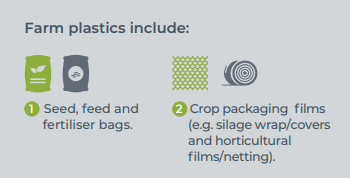An innovative project to address the environmental issues caused by soft agricultural plastics, such as the bags used for fertiliser, seed, and feed, as well as netting, silage wrap and twine, seeks to find sustainable solutions for these plastics at the end of their useful life.
 The farm plastics we’re finding solutions for
The farm plastics we’re finding solutions for
The scope of this project includes, but isn’t limited to, the following farm plastics:
- plastic sacks for packaging agricultural and horticultural commodities – including, fertiliser sacks, feed sacks and bulk tonne bags of woven polypropylene and/or polyethylene
- plastic wrapping materials for silage or hay – including baleage wrap, hay bale netting, baling twine and covers for silage pits
 How this is being done
How this is being done
The project aims to beef up the existing recycling services available to farmers and growers, like those Agrecovery offers for agrichemicals. The project analysed sustainable options, before making a recommendation on a preferred product stewardship scheme design to the Ministry for the Environment.
We have set up two product stewardship advisory groups – one for silage and horticulture film, and the other for stakeholders from the seed, feed, and fertiliser industry – to discuss scheme ideas.
To ensure that final service designs are built around farmer and grower needs, and the reality of farming businesses, a farmer reference group has been set up to provide the farmer perspective on the scheme design and delivery model.
To determine the size of the farm plastic waste problem, PricewaterhouseCoopers completed an initial survey for the project on the quantity of farm plastics in New Zealand and their eventual fate.
The project is sharing those initial findings with the industry so that it can refine the data.
The project is made possible through the Ministry of the Environment’s Waste Minimisation Fund (WMF) which is contributing $178,200 to the total project budget of $196,346.
- Read more about priority products
Green-farms Product Stewardship Scheme
The outcome of the farm plastics project co-design workstream is a proposal to implement an effective and sustainable regulated Green-farms Product Stewardship Scheme (GPSS) for accreditation in 2024. The GPSS is expected to collect and treat the most voluminous farm plastics across four farm plastics waste streams by 2026 and then add-on other farm plastics waste streams over the following four years. The goal being to effectively and sustainably collect and treat most farm plastics by 2030.
Read the Green-farms Product Stewardship Scheme Co-Design Report
